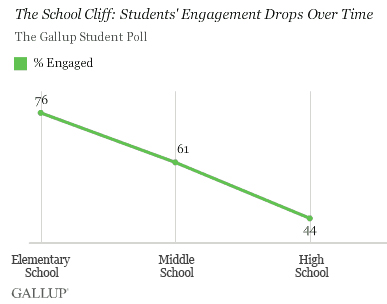This was one of the first viral education videos by Michael Wesch. It is as releveant today as it was 10 years ago.
Archives For students
(Credit: Constantine Pankin via Shutterstock)
I clipped the blog post by Brandon Busteed, Executive Director of Gallup Education The School Cliff: Student Engagement Drops With Each School Year earlier this year and added it to my Evernote “.Write” repository hoping to one day deal with this topic in a significant way. When I read the story I immediately agreed with Busteed’s assertion that a overzealous focus on standardized testing and the lack of experiential and project-based learning as probable causes of this drop in student engagement. But it wasn’t until this fall that I experienced, in a very personal way, how standardized testing and the supporting curriculum negatively impacted my older son’s engagement and attitude toward school. As the following data indicates this breakdown in engagement is rampant.

Source: Gallap.com
The Gallup Student Poll which surveyed nearly 500,000 students in grades five through 12 from more than 1,700 public schools in 37 states in 2012 revealed the sobering fact that the longer students stay in school, the less engaged they become. The survey asked students to indicate their level of agreement with statements such as: “My teachers make me feel my schoolwork is important,” and “At this school, I have the opportunity to do what I do best every day.”
From my anecdotal experience with my son Levi I would also have to add that standardized tests add a level of frustration and futility to the learning experience. We moved to North Vancouver to enable our boys to pursue their goals of professional downhill mountain bike racing. To ensure that they boys can commit enough time to riding and training and to allow for the flexibility the sport demands both of our boys are being home educated. They are engaged in math and science courses online and since the boy’s mother and I have a background in the humanities we are working with the boys on English, Social and History and are preparing the boys to challenge the Alberta Education departmental exams.
The Social 30 curriculum focus is on understanding the role that ideologies play in shaping identity. When I reviewed the text and supporting material I was excited to be able to explore some very significant life questions and issues with my son. I saw our working through this course as a way to further explore my son’s emerging identity and challenge him to think much deeper and more critically in his daily life. We have read through the first 5 chapters of the material, watched many videos and documentaries, worked through many review questions, discussed many of the historical issues that have emerged from the ideologies of individualism and collectivism and are starting to explore the impact of these fundamental perspectives on our modern society. Everything was going well and it was clear that Levi was not just understanding the material he was able to apply what he learned to an analysis of the world around him.
Since we are going to be challenging the course and Levi’s entire grade will be dependent upon this one exam we started working through some of the practice and sample exams from the previous years and soon realized that all the work on higher order thinking skills of analysis, application, synthesis were for naught because the exams were structured for recognition and regurgitation. Most of the multiple choice questions had at least 3 seemingly correct answers and the right answer was the one that repeated a phrase directly from the text. Even the supposed analysis questions required responses that were worded as close to the text as possible.
All our work at understanding and application didn’t prepare either Levi or I to do well on these exams–I worked through the exams as well and did only slightly better than Levi. We quickly realized that the best way to do well on the exams was to repeatedly go through the practice exams to get used to the way that the questions were structured and to be able to recognize the rightest answers. The exams were testing for information recognition and NOT understanding. I fully understand why teachers have to teach toward the test. Standardized testing forces this unfortunate practice.
Levi and I are still working toward understand but we have now added another component to our studies–test writing practice. Unfortunately that takes almost as much time as learning for understanding so our time on this subject has nearly doubled. For boys who are very serious about their commitment to being extreme athletes time is something that is very valuable and it is so frustrating that we have to WASTE so much of it on preparing for this exam.
My attitude toward teachers who teach to the test has completely changed. I regrettably understand why they have to do this–because I am having to do this. Last year in parent teacher interviews two of Levi’s teachers openly stated that in order to prepare Levi and his peers for the departmental exams and for university they had to teach to the test. The small charter school that Levi attending last year in Alberta boasted some of the highest high school achievement standards in the province and I now better understand how they got this ranking and what they had to do to get it. This is a systemic problem. A problem that we all know could easily be fixed if we moved away from an environment based on standardized testing to an active educational environment of active learning, critical and analytical thinking, collaboration and meaningful projects.
But teachers can’t make that move until the politicians and the ministries of education have the courage to move away from a culture of assessment to a culture of learning–this foolish notion that you can “fatten a pig by continuously weighing it”. Unfortunately, Alberta is moving toward more standardize testing in K-12 so these problems will persist.
I don’t see any significant and immeidate changes on the horizon that will improve the circumstances for my two boys but the results of the Equinox Summit – Learning 2030 indicate that learning in the future will be significantly different. Earlier this year the Waterloo Global Science Initiative hosted the Equinox Summit – Learning 2030 that was directed by Graham Brown-Martin, the founder of Learning Without Frontiers (LWF) a disruptive think tank focused on new ideas for learning and teaching practice, brought together 40 education thought leaders that worked together propose flexible, context and culturally sensitive solutions that would act as a foundation to define the global education systems in 2030. The group developed a Communique that proposes a radically different structure for learning in 2030, one in which traditional concepts of classes, courses, timetables, and grades are replaced by more flexible, creative
and student-directed forms of learning. As one can see from the points below the Summit proposed a system that emphasizes assessment that is nothing like the standardized testing that we are so stymied by today:
- Learning focuses on the development of lifelong learning practices and a sense of self, rather than facts and figures.
- Students learn through cross-disciplinary and often collaborative projects.
- Students connect with each other in fluid groupings that are dictated by their needs at any given moment.
- Teachers and other learning professionals serve as guides or curators of learning.
- Learning progress is measured through qualitative assessment of a student’s skills and competencies that document the learner’s entire experience, rather than measuring a discrete outcome.
- Decisions that affect the learning environment are made by stakeholder groups comprised of earners, teachers, governments, and parents, with learners and teachers playing a central role in decision-making.
- Schools empower both students and teachers, encouraging them to experiment with new ideas and fail safely, so that they develop the confidence to take risks.
I am hoping that these fundamentals are realized much sooner than 2030, because we need this type of a learning system TODAY. I am also hoping that there is the political will and academic leadership that will help bring this system about. In the mean time it is the responsibility of all educators to envision this type of a system for the future to work toward making it a reality today.
[youtube]KUMWEmeFlyU[/youtube]
Michael Wesch and his students are planning a new video. Unlike his acclaimed video Visions of Students Today, this video will be from the perspective of the student. Wesch has a call up on Youtube asking for video submissions that he and his students will be able to remix. Looking forward to seeing what he develops. More importantly I am looking forward to seeing our students perspective on learning.































